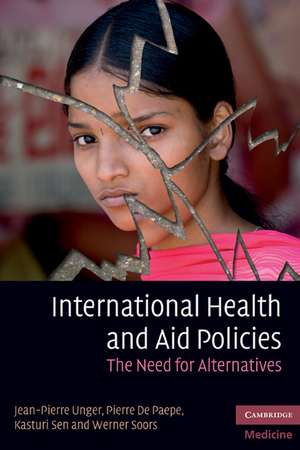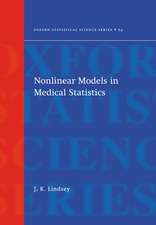International Health and Aid Policies: The Need for Alternatives
Autor Jean-Pierre Unger, Pierre De Paepe, Kasturi Sen, Werner Soorsen Limba Engleză Paperback – 22 sep 2010
Preț: 455.70 lei
Preț vechi: 479.68 lei
-5% Nou
Puncte Express: 684
Preț estimativ în valută:
87.20€ • 91.30$ • 72.32£
87.20€ • 91.30$ • 72.32£
Carte tipărită la comandă
Livrare economică 09-23 aprilie
Preluare comenzi: 021 569.72.76
Specificații
ISBN-13: 9780521174268
ISBN-10: 0521174260
Pagini: 314
Ilustrații: 5 b/w illus. 20 tables
Dimensiuni: 155 x 231 x 15 mm
Greutate: 0.54 kg
Ediția:New.
Editura: Cambridge University Press
Colecția Cambridge University Press
Locul publicării:Cambridge, United Kingdom
ISBN-10: 0521174260
Pagini: 314
Ilustrații: 5 b/w illus. 20 tables
Dimensiuni: 155 x 231 x 15 mm
Greutate: 0.54 kg
Ediția:New.
Editura: Cambridge University Press
Colecția Cambridge University Press
Locul publicării:Cambridge, United Kingdom
Cuprins
Introduction: overview and purpose; Part I. Aspects of International Health Policies: 1. Donor led policies: analysis of an underlying doctrine; 2. The Achilles heel of international health policies in low and middle income countries; Part II. The Failure of the Aid Paradigm: Poor Disease Control in Developing Countries: 3. Why do disease control programs require patients in publicly-oriented services to succeed in delivering? The case of malaria control in Mali; 4. How do disease control programs damage health care delivery in developing countries?; 5. Privatization (PPM-DOTS) strategy for tuberculosis control: how evidence based is it?; Part III. International Health Policies and their Impact on Access to Health Care in Low and Middle Income Countries: Some Recent Experiences from Latin America: 6. Costa Rica: achievements of a heterodox health policy; 7. Colombia: in-vivo test of health sector privatization; 8. Chile's neo liberal health reforms: an assessment and a critique; Part IV. Determinants and Implications of New Liberal Health Policies: the Case of India, China and the Lebanon: 9. Political and economic determinants of health: the case of India; 10. An economic insight into health care in six Chinese counties: equity in crisis; 11. Health care financing and delivery in the context of conflict and crisis: the Lebanon; Part V. Principles for Publicly-Oriented Health Care Policies, Planning, Management and Delivery: 12. Paradigm shifts; Section 1. The need to alter health systems missions; Section 2. The need to change public health methods; 13. Principles for an alternative social and democratic health policy; 14. Quality standards for health care delivery and management in publicly-oriented health services; 15. Principles of publicly-oriented health planning; 16. A code of good practice for the management of disease control programs; Part VI. Strategies to Develop Publicly-Oriented Health Systems and Services: 17. Person-centered care in LIC/MIC publicly-oriented services; 18. Improving access; Section 1. Access to health care (Ecuador); Section 2. Access to drugs (Senegal); 19. Non-managed care techniques to improve clinical decision making; Section 1. Versatile techniques; Section 2. Interface flow-process audit; 20. Reorienting academic missions: how can public health departments best support access to good quality comprehensive health care?; Conclusion.
Recenzii
'International Health and Aid Policies: The Need for Alternatives represents an important and comprehensive effort in gathering the evidence of the grave consequences on developing countries' health systems of some international health and aid policies that promote excessive reliance on disease specific programs and commercialised care. The book proposes alternative policy scenarios … and highlights the key role of health system researchers in influencing the development of pro-equity international health policies and the evaluation of their impact. The thorough review of historic data and trend analysis will serve scholars and decision makers alike.' Mirta Roses, Pan American Health Organization, Regional Office of the World Health Organization
'Timing is everything in comedy and in scholarship. One cannot imagine a better timing for this book's publication. The title of the book promises to make a call for health services with a clear social mission; and this it fully delivers. Here is a book that paves the way in a direction using the right political analyses. It tells us that it has been donors who have pushed the patterns of commercialisation of health in poor countries; and that aid policies share a large responsibility for the breakdown of the health systems of many of the poor countries we currently see. It highlights the contradictions of public provision under the guise of commercialised health care looking at two decades of neoliberal policy that has systematically undermined access to quality health care services for a majority of the world population. This, it rightly claims, receives far too little attention in the literature. The book is clear about the need for a policy shift that re-establishes the right to access to quality healthcare. It proposes a health policy based on a political philosophy in an attempt to reconcile professional, cultural and political ethics. It clearly states that health policy is political in the sense that it refers to actions (deeds) meant to challenge the structures of power and social organisation from an ethical perspective. For all these reasons, the People's Health Movement feels the principles of its People's Charter for Health are here represented; our worldwide membership would want to read it.' Bridget Lloyd, People's Health Movement Co-ordinating Commission
'This important book challenges the dominant discourse on global health and the growing commoditization of health care to the detriment of poor people all over the world. The serious and evidence-based questions and facts raised by the authors on the relentless promotion of private sector growth in health must now be answered.' Anna Marriott, Development Finance and Public Services Team, Oxfam GB
'This book comes at a time of a highly needed reform in the Global Health Governance and the International Health Aid Architecture. The attention to health has been enhanced in global fora and health aid has tripled in the last decade. We all share responsibility and the challenge to address the highly fragmented health landscape. The EU is developing a new policy framework aimed at greater equity and coherence in the EU role in Global Health. The agreed global commitment to universal coverage rescuing the Alma-Ata principles and applying the principles of partnership and ownership to health in development aid, are clear opportunities. The reflections of this book will be a valuable reference for our debate and the enhanced EU role in the global health challenges.' Juan Garay, Public Health Physician, Health Team coordinator, DG Development, European Commission
'Timing is everything in comedy and in scholarship. One cannot imagine a better timing for this book's publication. The title of the book promises to make a call for health services with a clear social mission; and this it fully delivers. Here is a book that paves the way in a direction using the right political analyses. It tells us that it has been donors who have pushed the patterns of commercialisation of health in poor countries; and that aid policies share a large responsibility for the breakdown of the health systems of many of the poor countries we currently see. It highlights the contradictions of public provision under the guise of commercialised health care looking at two decades of neoliberal policy that has systematically undermined access to quality health care services for a majority of the world population. This, it rightly claims, receives far too little attention in the literature. The book is clear about the need for a policy shift that re-establishes the right to access to quality healthcare. It proposes a health policy based on a political philosophy in an attempt to reconcile professional, cultural and political ethics. It clearly states that health policy is political in the sense that it refers to actions (deeds) meant to challenge the structures of power and social organisation from an ethical perspective. For all these reasons, the People's Health Movement feels the principles of its People's Charter for Health are here represented; our worldwide membership would want to read it.' Bridget Lloyd, People's Health Movement Co-ordinating Commission
'This important book challenges the dominant discourse on global health and the growing commoditization of health care to the detriment of poor people all over the world. The serious and evidence-based questions and facts raised by the authors on the relentless promotion of private sector growth in health must now be answered.' Anna Marriott, Development Finance and Public Services Team, Oxfam GB
'This book comes at a time of a highly needed reform in the Global Health Governance and the International Health Aid Architecture. The attention to health has been enhanced in global fora and health aid has tripled in the last decade. We all share responsibility and the challenge to address the highly fragmented health landscape. The EU is developing a new policy framework aimed at greater equity and coherence in the EU role in Global Health. The agreed global commitment to universal coverage rescuing the Alma-Ata principles and applying the principles of partnership and ownership to health in development aid, are clear opportunities. The reflections of this book will be a valuable reference for our debate and the enhanced EU role in the global health challenges.' Juan Garay, Public Health Physician, Health Team coordinator, DG Development, European Commission
Notă biografică
Descriere
Using international case studies to critique recent health and aid policies, this book presents strategies to create fairer health services.












